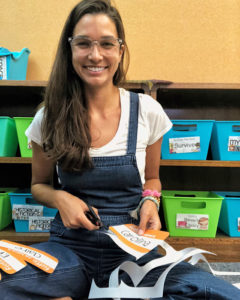This blog post was written by NCTE member Ashlan Bishop.
My mom was an elementary teacher, and she was an excellent one. She was always trying new things with her fifth graders and executed with a level of detail that made her the teacher often pointed out to model a strategy. She had high expectations but also a lot of patience when kids made real kid choices. Her classroom library system alone made my type-B brain go into overload. For so long I said I would never be a teacher after seeing how challenging the job was up close. Inevitably, though, I felt the pull and followed her lead into the classroom.
Stubborn streak going strong, I still resisted asking her for advice. I wanted to become my own educator, whatever that would look like for me. I think I was avoiding comparing myself but also thought that finding my unique teaching style was important. I still wholeheartedly support that; however, having total blinders on only lasted until I actually stepped into my own classroom. The first-year-teacher overwhelm is. so. real. I learned quickly to take help and advice from anyone who would give it. I didn’t always follow the advice, but picking out the best pieces of wisdom from many sources certainly helped me tackle all the newness. Naturally, I came around and also started asking my mom for help. I taught that first year at the local elementary school by my parents’ house, so I would stop by frequently after school to raid their snack drawer but also to get advice or inspiration to keep going in the classroom.
The best thing my mom ever told me bridges the gap between our different teaching styles. I would go so far as to say it has a place in all teachers’ work in any school community— a universal best practice. It was also one of the first things she shared. Now, as a graduate student, it is the advice I hope most to pass on to preservice teachers, whatever type of teacher they become.
Early in that first year, in the context of discussing a difficult conversation with a parent, my mom said that the most important thing you can do for your students is to “lead with love.” Tell them you love them. Tell their loved ones why you love them. Tell them often and get specific. I’m not sure I totally understood both the simplicity and the depth of that advice in the moment, but its nuance has evolved as I continued to teach, while the core has held true in every teaching situation I’ve been in. The way students feel in classrooms is important. Not only for our ability to teach them and their motivation to learn, but for their sense of belonging and well-being in and of itself. Students of all ages need the protective net of loving adult relationships.
Teachers know this. I knew it when she gave me the advice back then. But knowing the importance of love in teaching and leading with it are two different things. Teaching can be so challenging, and priorities are many in the classroom. But her point was that loving should be the first priority and the one made most clear. Difficult parent-teacher conference? Start with something you love about their student. Kids can’t seem to get along this week? Facilitate a discussion about how you want the classroom to reflect the care you have for each of them. Student disengaged from class? Drop a note about something you’ve noticed and love about them. Behind your pacing guide? Do the community-building activity at the start of class anyway. After I got through that first year and moved on to teach other grades in other schools in different communities, I always tried to keep that advice in the forefront of my approach. How am I leading with love? Do my students, families, coworkers see and hear this before other messages? After some distance from that overwhelming first year, it’s the times I led with love that I am the most proud of.
My classroom library never ended up looking like my mom’s, and we sometimes disagreed on the best course of action to take in various classroom scenarios. We still do. That’s ok. Authenticity in teaching is, in fact, important for sustaining oneself through such hard work. But take it from my mom—lead with the love part. Often, out loud, specifically, and first. It will always be the right teaching style.

Ashlan Bishop is a doctoral student in the Department of Teaching and Learning at The Ohio State University interested in equity-focused pedagogies and arts-based instruction. She previously was an elementary school teacher in Florida. She can be reached at ashlanbishop@gmail.com.
It is the policy of NCTE in all publications, including the Literacy & NCTE blog, to provide a forum for the open discussion of ideas concerning the content and the teaching of English and the language arts. Publicity accorded to any particular point of view does not imply endorsement by the Executive Committee, the Board of Directors, the staff, or the membership at large, except in announcements of policy, where such endorsement is clearly specified.

